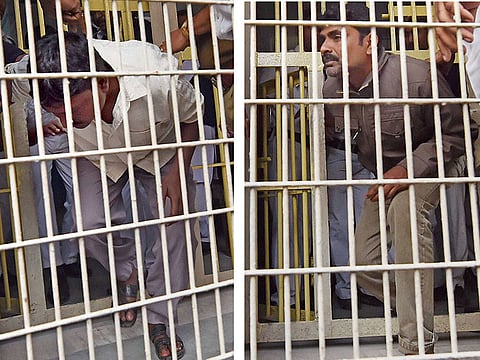Six found guilty in Kamduni rape case
Threatened victim’s brother of dire consequences as judge pronounced verdict

Kolkata:
A local court in Kolkata convicted six people accused of gang rape and murder of a 21-year-old college student in West Bengal’s Kamduni on Thursday.
Of the nine accused, two were released by the court due to lack of evidence, while another accused Gopal Naskar, (65) died in custody during the trial due to fever and septicaemia in August last year.
Though the courts will pronounce the quantum of punishment Friday, there was high drama inside the courtroom when the prime accused, Ansar Ali broke police barricade and attacked the victim’s brother threatening him of dire consequences.
The crime dates back to June 7, 2013, when the victim a second-year graduate student was returning home after exams was abducted and taken to an isolated factory compound where she was gang-raped, and then killed in a village in Kamduni, about 30 kilometres from Kolkata. Her body was found that night by her brother in a canal.
The case triggered public outcry as common citizens demanded better safety for women, after which Chief Minister Mamata Banerjee visited the home of the dead student. She controversially accused the neighbours of the victim during that visit of having links with communist party and Maoists, provoking criticism and fresh protests throughout the state.
The two-and-a-half year long trial was mired with legal complexities and many believed the victim would not get justice.
The state’s Criminal Investigation Department, which probed the matter, started off on a wrong footing after submitting a chargesheet that was rejected by the court. The investigating agency finally submitted a supplementary chargesheet. There was also a legal battle after the magistrate who started hearing the case failed to provide a lawyer to the accused. Demonstrations by locals against the crime also led to complications.
The case was then moved to Kolkata, but the process was slow as a total of 31 witnesses were examined by the court during the process of hearing.
Finally, the high court had to intervene yet again to expedite the trail. There was possibility of further delay after Judge Sanchita Sarkar was transferred. The accused then wrote to the Chief Justices of India and Calcutta high court, praying for this order to be held back as a new judge would have to hear the matter all over again.
The transfer order was eventually put on hold and Sarkar was allowed to complete the case.
Sign up for the Daily Briefing
Get the latest news and updates straight to your inbox



